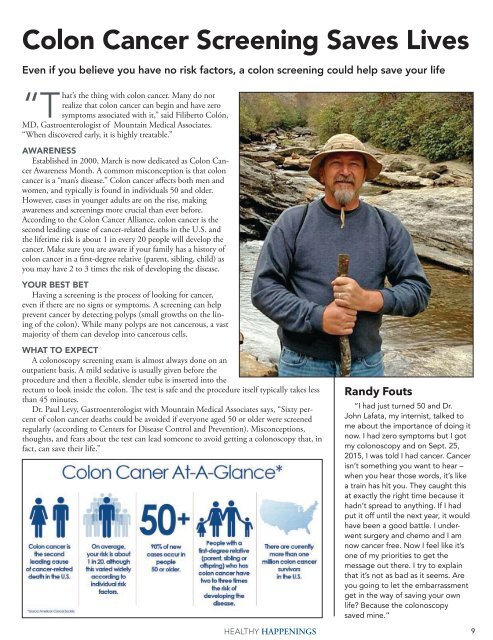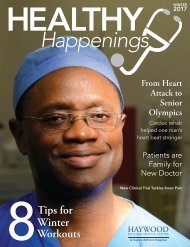HRMC_Vol 01 Iss 01 FINAL
Create successful ePaper yourself
Turn your PDF publications into a flip-book with our unique Google optimized e-Paper software.
Colon Cancer Screening Saves Lives<br />
Even if you believe you have no risk factors, a colon screening could help save your life<br />
the thing with colon cancer. Many do not<br />
realize that colon cancer can begin and have zero<br />
“That’s<br />
symptoms associated with it,” said Filiberto Colón,<br />
MD, Gastroenterologist of Mountain Medical Associates.<br />
“When discovered early, it is highly treatable.”<br />
AWARENESS<br />
Established in 2000, March is now dedicated as Colon Cancer<br />
Awareness Month. A common misconception is that colon<br />
cancer is a “man’s disease.” Colon cancer affects both men and<br />
women, and typically is found in individuals 50 and older.<br />
However, cases in younger adults are on the rise, making<br />
awareness and screenings more crucial than ever before.<br />
According to the Colon Cancer Alliance, colon cancer is the<br />
second leading cause of cancer-related deaths in the U.S. and<br />
the lifetime risk is about 1 in every 20 people will develop the<br />
cancer. Make sure you are aware if your family has a history of<br />
colon cancer in a first-degree relative (parent, sibling, child) as<br />
you may have 2 to 3 times the risk of developing the disease.<br />
YOUR BEST BET<br />
Having a screening is the process of looking for cancer,<br />
even if there are no signs or symptoms. A screening can help<br />
prevent cancer by detecting polyps (small growths on the lining<br />
of the colon). While many polyps are not cancerous, a vast<br />
majority of them can develop into cancerous cells.<br />
WHAT TO EXPECT<br />
A colonoscopy screening exam is almost always done on an<br />
outpatient basis. A mild sedative is usually given before the<br />
procedure and then a flexible, slender tube is inserted into the<br />
rectum to look inside the colon. The test is safe and the procedure itself typically takes less<br />
than 45 minutes.<br />
Dr. Paul Levy, Gastroenterologist with Mountain Medical Associates says, “Sixty percent<br />
of colon cancer deaths could be avoided if everyone aged 50 or older were screened<br />
regularly (according to Centers for Disease Control and Prevention). Misconceptions,<br />
thoughts, and fears about the test can lead someone to avoid getting a colonoscopy that, in<br />
fact, can save their life.”<br />
HEALTHY HAPPENINGS<br />
Randy Fouts<br />
“I had just turned 50 and Dr.<br />
John Lafata, my internist, talked to<br />
me about the importance of doing it<br />
now. I had zero symptoms but I got<br />
my colonoscopy and on Sept. 25,<br />
2<strong>01</strong>5, I was told I had cancer. Cancer<br />
isn’t something you want to hear –<br />
when you hear those words, it’s like<br />
a train has hit you. They caught this<br />
at exactly the right time because it<br />
hadn’t spread to anything. If I had<br />
put it off until the next year, it would<br />
have been a good battle. I underwent<br />
surgery and chemo and I am<br />
now cancer free. Now I feel like it’s<br />
one of my priorities to get the<br />
message out there. I try to explain<br />
that it’s not as bad as it seems. Are<br />
you going to let the embarrassment<br />
get in the way of saving your own<br />
life? Because the colonoscopy<br />
saved mine.”<br />
9



